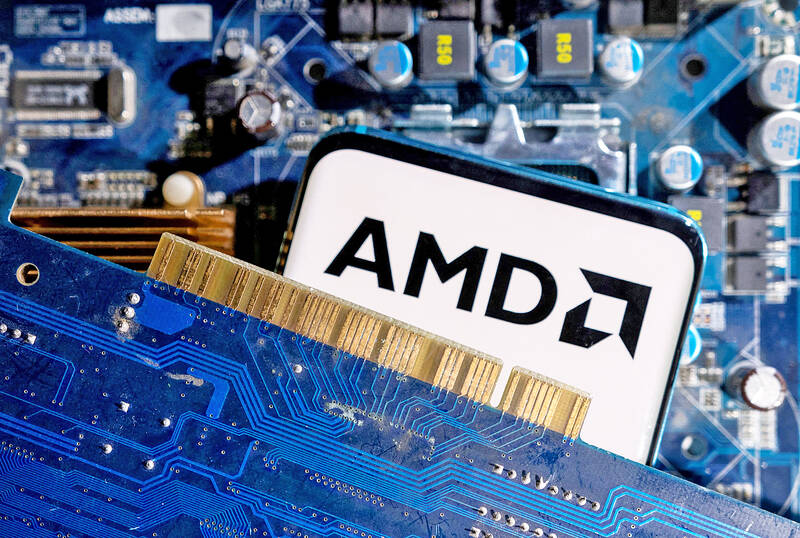Advanced Micro Devices Inc (AMD) has applied to set up a research and development (R&D) center in Taiwan as part of the government’s “A+ Industrial Innovative R&D Program,” the Ministry of Economic Affairs said yesterday.
The ministry did not disclose the investment amount or what the plan is.
The program covers three major fields — artificial intelligence (AI), new generation semiconductors, including high-power and high-frequency integrated circuits (ICs), and new 5G network structures.

Photo: Dado Ruvic, Reuters
It aims to encourage local and foreign technology firms to invest in Taiwan and for the nation to become a global R&D hub, the Executive Yuan said.
A qualified applicant would receive a subsidy worth up to 50 percent of its investment.
AMD is planning to invest about NT$5 billion (US$155 million) and the ministry has given the company conditions that must be met to receive the subsidy, local media reported, citing an unnamed government source.
AMD was to work with Taiwanese IC designers to develop the domestic IC industry, the source said, adding that the servers which use its AI chips would also be produced in Taiwan.
The ministry also required AMD to recruit enough foreign talent to account for at least 20 percent of its R&D workforce in Taiwan, so that the tech giant would not have to compete with Taiwanese firms for local talent, the source said.
The source said that the ministry wanted AMD to work with Taiwanese universities to help cultivate talent.
AMD has responded positively to the ministry’s conditions, the source added.
AMD CEO Lisa Su (蘇姿丰) is scheduled to attend the Computex Taipei trade show early next month and is expected to discuss R&D plans with the administration of President William Lai (賴清德), who was sworn yesterday, local media reports said.
The ministry has approved several investment applications filed by several tech heavyweights wanting to invest in Taiwan under the program.
Investors include Netherlands-based semiconductor equipment supplier ASML Holding NV, US wafer fabrication equipment supplier Lam Research Corp and US semiconductor equipment supplier Applied Materials Inc.
In 2021, US chip giant Nvidia Corp secured approval for its investment plan under the “Supreme A+ Program.”
The AI innovation and R&D center program, which began in 2020, aims to attract innovators to invest in state-of-the-art technologies relating to semiconductors, communications and AI in Taiwan.
Nvidia’s investment plan aimed to set up an AI R&D center through a NT$24.3 billion investment, with the ministry providing a subsidy worth NT$6.7 billion. The company is to cooperate with enterprises and universities through its investments.

TARIFFS: The global ‘panic atmosphere remains strong,’ and foreign investors have continued to sell their holdings since the start of the year, the Ministry of Finance said The government yesterday authorized the activation of its NT$500 billion (US$15.15 billion) National Stabilization Fund (NSF) to prop up the local stock market after two days of sharp falls in reaction to US President Donald Trump’s new import tariffs. The Ministry of Finance said in a statement after the market close that the steering committee of the fund had been given the go-ahead to intervene in the market to bolster Taiwanese shares in a time of crisis. The fund has been authorized to use its assets “to carry out market stabilization tasks as appropriate to maintain the stability of Taiwan’s

STEEP DECLINE: Yesterday’s drop was the third-steepest in its history, the steepest being Monday’s drop in the wake of the tariff announcement on Wednesday last week Taiwanese stocks continued their heavy sell-off yesterday, as concerns over US tariffs and unwinding of leveraged bets weighed on the market. The benchmark TAIEX plunged 1,068.19 points, or 5.79 percent, to 17,391.76, notching the biggest drop among Asian peers as it hit a 15-month low. The decline came even after the government on late Tuesday authorized the NT$500 billion (US$15.2 billion) National Stabilization Fund (國安基金) to step in to buoy the market amid investors’ worries over tariffs imposed by US President Donald Trump. Yesterday’s decline was the third-steepest in its history, trailing only the declines of 2,065.87 points on Monday and

TARIFF CONCERNS: The chipmaker cited global uncertainty from US tariffs and a weakening economic outlook, but said its Singapore expansion remains on track Vanguard International Semiconductor Corp (世界先進), a foundry service provider specializing in producing power management and display driver chips, yesterday withdrew its full-year revenue projection of moderate growth for this year, as escalating US tariff tensions raised uncertainty and concern about a potential economic recession. The Hsinchu-based chipmaker in February said revenues this year would grow mildly from last year based on improving supply chain inventory levels and market demand. At the time, it also anticipated gradual quarter revenue growth. However, the US’ sweeping tariff policy has upended the industry’s supply chains and weakened economic prospects for the world economy, it said. “Now

An employment discrimination lawsuit against contract chipmaker Taiwan Semiconductor Manufacturing Co (TSMC, 台積電) might soon be expanded after a hearing in a federal court in San Jose, California, on Tuesday to add 15 plaintiffs to the case. According to a court document, the lawsuit, which was refiled in November last year as a form of a class action with 13 plaintiffs in California, wants to add 15 plaintiffs from Arizona, where TSMC is building up its wafer fab capacity. TSMC first committed between 2020 and last year to invest US$65 billion in three advanced wafer fabs in Arizona. It then pledged an